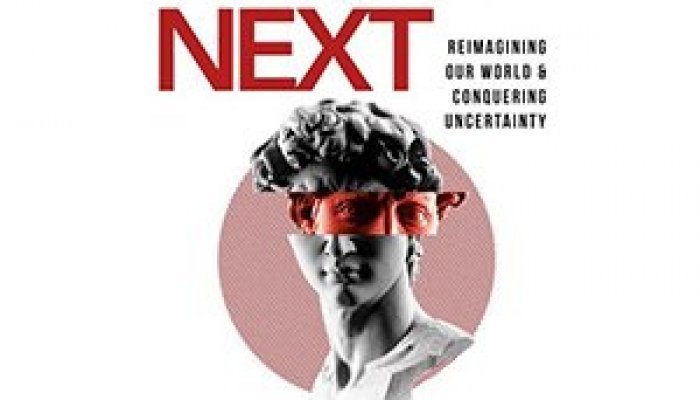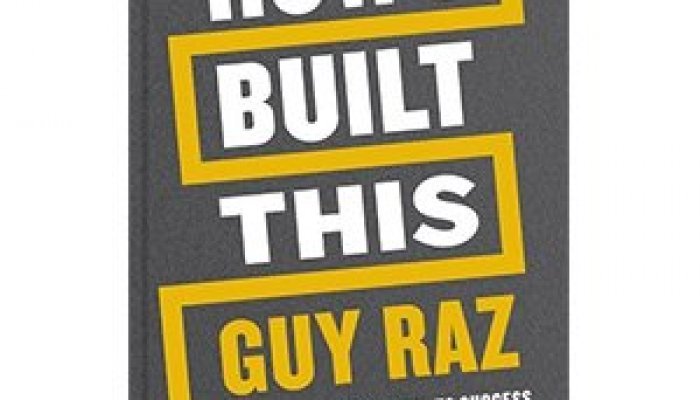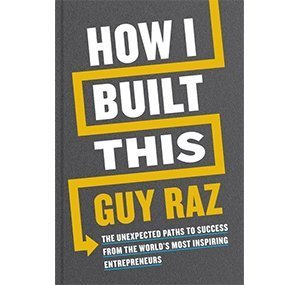
How I Built This – The Unexpected Paths to Success From the World’s Most Inspiring Entrepreneurs
Guy Raz
Pan Macmillan – R330
If you are an avid follower of America’s National Public Radio (NPR), there’s a fair chance you might have come across the work of journalist and podcaster, Guy Raz. Over the past four years, Raz has built something of a podcast empire, with more than 15 million regular listeners who download three programmes: How I Built This, TED Radio Hour, and the children’s programme Wow in the World. This book is the spin-off from the first of the three, How I Built This,and unravels interviews with and insights from the world’s top entrepreneurs.
Combine the reach and power of NPR with Raz’s skill as a storyteller, and two things emerge. First, access to just about all the people who have made it ‘big’ in the US over the past 30 or so years. Second, an eminently readable series of tales about their journeys which Raz has structured into one of the best manuals on entrepreneurship I have read.
Key to this is the word ‘story’. Humans love stories; we learn through stories, and Raz sees himself not so much as a writer or journalist but as a storyteller. He’s a very good one and has used a classic story structure – the hero’s journey – not only for his book, but also to analyse the people we meet in How I Built This. In case you’re unfamiliar with the hero’s journey, it’s as old as the hills: the hero has ‘a crazy idea’, as Raz calls it, goes off on a mission, survives many near-death experiences, and returns home in triumph.
It also happens to fit the entrepreneur’s journey perfectly – a ‘crazy idea’, many near-death experiences (usually financial, but not always), and eventual triumph. Or, as Raz puts it in the headings of his book’s three sections: The Call, The Test(s), The Destination.
Along the way, we encounter a veritable Who’s Who of super-successful ‘heroes’: among them New Zealander, Tim Brown, who founded Allbirds, Daymond John of FUBU, Jen Rubio of Away Luggage, and Jane Wurwand, founder of Dermalogica, to name just a few. (There’s a South African connection in Wurwand’s story which I knew nothing about but I’m not going to spoil it for you – you’ll have to read the book!) Each one has an almost unique set of challenges to overcome, and Raz has selected them as excellent examples of how such challenges are overcome.
Take Airbnb, whose founders Joe Gebbia, Brian Chesky and Nathan Blecharczyk had to ‘bootstrap’ their fledgeling company for more than two long years. ‘Bootstrapping’ is the process of keeping the company alive by any means possible – mainly mountains of credit card debt in Airbnb’s case. Professional investors – venture capitalists – see it as an important part of the growth and development process for a young company.
Just as instructive, though, is to understand that Airbnb only began to leave the bootstrapping phase when Gebbia, Chesky and Blecharczyk finally got their ‘story’ straight: what it was that Airbnb actually did, and why customers would use the service. At that point, it also became clear to the three that quality of the pictures of the accommodation on offer would be the difference between success and failure. Airbnb is now worth somewhere upwards of US$30 billion and has disrupted the global hospitality industry, so it’s a story worth studying.
If you’re thinking of launching your own start-up or perhaps battling to keep one going, or even just thinking about investing in one, How I Built This is an absolute must-read.
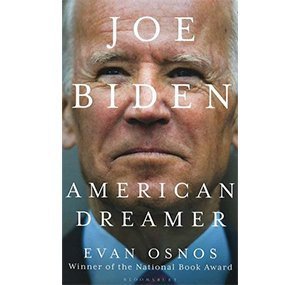
Joe Biden – American Dreamer
Evan Osnos
Bloomsbury – R450
The accession of a new president in the United States is always an important moment not only for that country but also for the rest of the world. What policies will change, if any? In what way will he be different from his predecessor? What will Joe Biden mean for us down here on the southern tip?
His biographer, Evan Osnos, a staff writer for The New Yorker magazine, makes one thing abundantly clear in that regard: after many years as chairman of the US Senate Foreign Relations Committee, as well as two terms as Barack Obama’s vice-president, Biden certainly knows where South Africa sits on a map, unlike his predecessor. Furthermore, Biden is almost certainly to know at least a handful of people in government here. I can state that with confidence because, according to Osnos, that’s part of Joe Biden’s schtick. He’s one of those guys who always seems to know a couple of people wherever he steps off the plane.
That ability is perhaps not surprising, given the length of his career in the Senate before becoming vice-president. Elected in January 1973, Biden served until the same month in 2009. Famed for his long-winded and sometimes gaffe-filled speeches, Biden, a Democrat, also has a deserved reputation for being able to reach across the bitterly partisan aisle to secure deals with the Republicans. It’s too early in his term as US President to know if he’ll be able to reach out from the West Wing and achieve the same thing.
Biden may know this country’s geographical location, but given the scale of the tasks that lie ahead of him, it’s unlikely that South Africa will feature high on his agenda. Cleaning up after Donald Trump, repairing relations with allies, especially in Europe, extricating America from the grip of the Covid-19 pandemic – it’s a formidable list.
Osnos’ biography is a fast read, packed with telling detail and sharp observations. It’s an excellent introduction to a man we’re going to be watching very closely for the next four years.
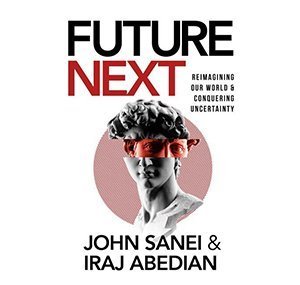
FutureNEXT – Re-imagining Our World and Conquering Uncertainty
John Sanei & Iraj Abedian
Mercury – R285
There’s no doubt that the Covid-19 pandemic has had – and continues to have – a profound impact on our lives, families and businesses. For some, it has meant catastrophic loss, perhaps of a loved one or a job. For the bulk of us, in the pandemic’s wake has come disruption, discomfort and disturbance. But whatever the cost and the impact, it has also presented – or ‘forced’ might be a better description – an opportunity for a rethink about our lives, a time to take stock of the way we do things, and to consider what we might want the future to look like.
To that end, well-known economist, Dr. Iraj Abedian, and futurist, John Sanei, have produced FutureNEXT, which, according to its subtitle, is about re-imagining our world and conquering uncertainty.
The authors’ starting point is that the world we knew before the pandemic was headed very much in the wrong direction. They point to overconsumption, climate change and the concentration of massive amounts of wealth in the hands of a tiny minority. They believe this needs to change, but it’s very much up to us, as individuals, to bring this into effect. They take six categories of people – consumers, employees, employers, entrepreneurs, executives and policy-makers – and ask what each one can do to play their part, and then end off with a list of questions designed to stimulate thought: “Am I self-aware as a consumer?”, for example, or “Do I need so many things in my life?”
If you are lucky enough to have the time and space in which to rethink your future, you will find FutureNEXT a useful tool to help you with that process. However, if, like so many, you’re now in a desperate race to find employment or just to survive, it may feel a little theoretical or even ethereal.



